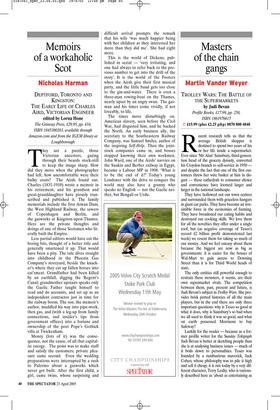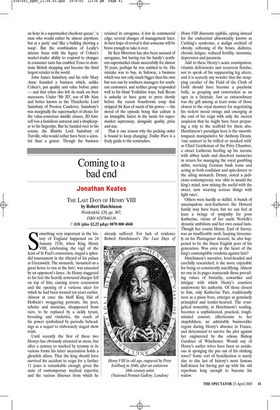Masters of the chain gangs
Martin Vander Weyer
TROLLEY WARS: THE BATTLE OF THE SUPERMARKETS by Judi Bevan Profile Books, £17.99, pp. 258, ISBN 1861976615 ✆ £15.99 (plus £2.25 p&p) 0870 800 4848 Recent research tells us that the average British shopper is destined to spend two years of his or her life inside a supermarket. Ever since ‘Mr Alan’ Sainsbury, third-generation head of the grocery dynasty, converted his Croydon branch to self-service in 1950 and despite the fact that one of the first customers threw her wire basket at him in disgust — these cathedrals to consumer choice and convenience have loomed larger and larger in the national landscape.
They have hollowed out our town centres and surrounded them with graceless hangars in giant car parks. They have become an irresistible force in the economics of farming. They have broadened our eating habits and destroyed our cooking skills. We love them for all the novelties they offer under a single roof, but (as negative coverage of Tesco’s record £2 billion profit demonstrated last week) we resent them for taking so much of our money. And we feel uneasy about them because the biggest are now as big as governments: it is easier for the bosses of Wal-Mart to gain access to Downing Street than it is for Third World heads of state.
The only entities still powerful enough to restrain these monsters, it seems, are their own supermarket rivals. The competition between them, past, present and future, is Judi Bevan’s subject in Trolley Wars. She provides brisk potted histories of all the main players, but in the end there are only three important questions: why is Tesco so good at what it does, why is Sainsbury’s so bad when we all used to think it was so good, and what on earth possessed Morrisons to buy Safeway?
Luckily for the reader — because as a former profile writer for the Sunday Telegraph Judi Bevan is better at sketching people than she is at analysing business issues — much of it boils down to personalities. Tesco was founded by a rumbustious maverick, Jack Cohen, whose philosophy was to pile it high and sell it cheap; it is run today by a very different character, Terry Leahy, who is variously described here as ‘about as entertaining as an hour in a supermarket checkout queue’, ‘a man who would rather be almost anywhere but at a party’ and ‘like a bulldog chewing a wasp’. But the combination of Leahy’s intense focus with the legacy of Cohen’s market-trader ability to respond to changes in consumer taste has enabled Tesco to dominate British shopping and become the third largest retailer in the world.
John James Sainsbury and his wife Mary Anne founded a business which, unlike Cohen’s, put quality and value before price — and that ethos also left its mark on their successors. Under ‘Mr JD’, son of Mr Alan and better known as the Thatcherite Lord Sainsbury of Preston Candover, Sainsbury’s was marginally the supermarket of choice for the value-conscious middle classes. JD himself was a fastidious autocrat and a shopkeeper to his fingertips. But he handed over to his cousin, the Blairite Lord Sainsbury of Turville, who would rather have been a scientist than a grocer. Though the business retained its arrogance, it lost its commercial edge; several changes of management later, its best hope of revival is that someone will be brave enough to take it over.
Sir Ken Morrison has also been accused of arrogance, but having run his family’s northern supermarket chain successfully for almost 50 years, perhaps he was entitled to be. His mistake was to buy, in Safeway, a business which was not only much bigger than his own but was run by southern managers for southern customers, and neither group responded well to his blunt Yorkshire ways. Judi Bevan is unlucky to have gone to press shortly before the recent boardroom coup that stripped Sir Ken of much of his power — the moral of the episode being that culture is an intangible factor in the tussle for supermarket supremacy, alongside quality, price and size.
That is one reason why the pecking order is bound to keep changing: Trolley Wars is a lively guide to the contenders.




















































 Previous page
Previous page